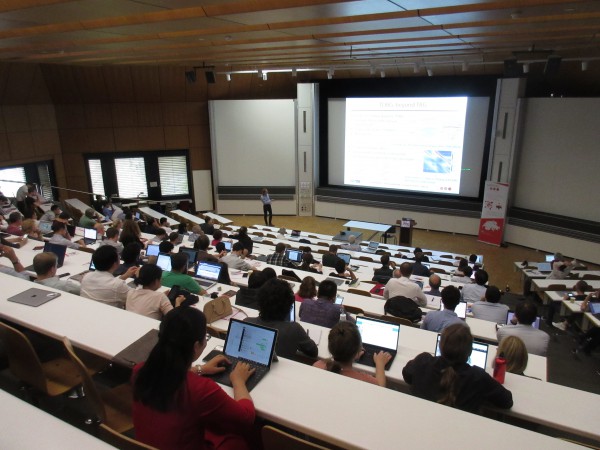MARVEL Review and Retreat 2020
Sep 10, 2020, 14:00 until Sep 11, 2020, 16:30, Zoom
The access information will be communicated to the MARVEL community. If you are not a MARVEL member and wish to attend, you are very welcome to do so: please contact us.
Schedule
Thursday, September 10
14:00 — Welcome & introduction (Nicola Marzari)
14:15 — D&D1: Organic Crystals
- The role of thermal and quantum fluctuations on the stability of molecular materials (Venkat Kapil)
- Efficient representations of local and non-local interactions for atomistic machine learning (Jigyasa Nigam)
- Electron-density learning for (bio)molecules and materials (Alberto Fabrizio)
14:40 — D&D2: Metal Alloys
- Machine learning for metallurgy: Al-Cu alloys (Daniel Marchand)
- Machine learning for Al-Mg-Si: precipitation, clustering and vacancy traps (Abhinav Jain)
- Librascal: fast, flexible computation of representations to accelerate atomistic machine learning simulations (Max Veit)
15:05 — Break
15:20 — D&D3: Low Dimensional Materials
- Ab initio modeling of thermal transport through van der Waals materials (Sara Fiore)
- Subdiagonalization method for efficient post-DFT calculations (Guido Gandus)
- High-throughput discovery of new low dimensional materials, focus on 2d-superconductors (Davide Campi)
15:45 — D&D4: Nanoporous Materials
- Efficient ab-initio X-ray photoelectron spectroscopy method for large molecular systems (Augustin Bussy)
- Unraveling the synergy between metal-organic frameworks and co-catalysts in photocatalytic water splitting (Stefano Falletta)
- Charge separation and charge carrier mobility in photocatalytic metal-organic frameworks (Maria Fumanal)
16:10 — D&D5: Correlated Oxides
- Normal state of Nd1−xSrxNiO2 from self-consistent GW+EDMFT (Francesco Petocchi)
- RNiO3 (R = rare earth) perovskites at the TMIT --> 0 K limit: correlation of structural and electronic properties (Maximilian Klein)
- Defect-induced ferroelectricity in complex oxides: new insights from self-consistent DFT+U (Chiara Ricca and Jaime Souto Casares)
16:45 — End
Friday, September 11
14:00 — Welcome
14:05 — D&D6: Topological Materials
- Flat bands and Landau levels of twisted double bilayer graphene (Quansheng Wu)
- Topological Euler class in Weyl semimetal ZrTe (Tomáš Bzdušek)
- Photoemission spectroscopy investigation of kagome magnet Fe3Sn2 (Sandy Ekahana)
14:30 — Inc1: Solid-State Ionics
- Computational discovery of solid-state ionic conductors (Giuliana Materzanini)
- Experimental validation of oxide-based lithium ion conductors (Elisa Gilardi)
- Ongoing evaluations of potential solid-state electrolytes (Steven David Lacey)
14:55 — Inc2: Machine Learning
- Uniqueness tests for atomistic representations (Miriam Stuke)
- A generative network for sampling molecules with desired properties (Mario Wieser)
- The QML code: a Python framework for machine learning in chemical compound space (Anders Christensen)
15:20 — Break
15:40 — OSP: Open Science Platform
- Automated and robust DFT calculations for everyone with AiiDA lab (Carl S. Adorf)
- FAIR sharing and long-term storage with the Materials Cloud Archive (Valeria Granata)
- Band structures from Koopmans-compliant spectral functionals: an open-source periodic-boundary implementation (Nicola Colonna)
16:05 — HPC and Future Architectures
- SIRIUS a domain specific library for PW DFT (Anton Kozhevnikov)
- Robust wavefunction optimization for high throughput (Simon Pintarelli)
- Communication optimal matrix multiplication for RPA calculations (Marko Kabic)
16:30 — End

Oleg Yazyev talk at MARVEL Review and Retreat, September 5, 2019.
Stay in touch with the MARVEL project
Low-volume newsletters, targeted to the scientific and industrial communities.
Subscribe to our newsletter